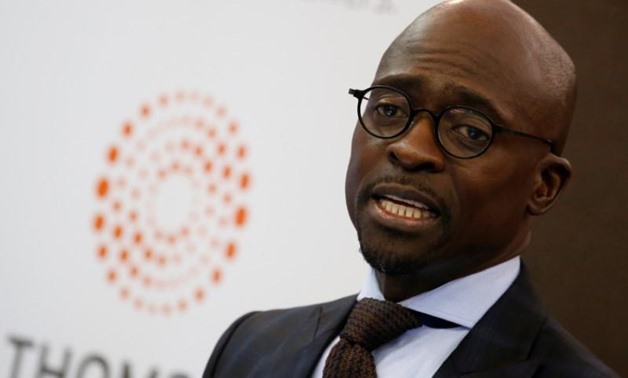
South Africa's Finance Minister Malusi Gigaba looks on as he speaks during the Thomson Reuters economist of the year awards in Sandton, South Africa July 13, 2017. REUTERS/Siphiwe Sibeko
JOHANNESBURG – 19 October 2017: South Africa’s finance minister is expected to address concerns over dwindling tax revenues in his mid-term budget on Wednesday to reassure credit agencies of his commitment to a tighter purse, a Reuters poll found.
Malusi Gigaba is due to give his first review on finances on Oct. 25 and economists expect him to announce a revenue shortfall of 40 billion rand ($3.0 billion) for the year that began in March due to poor tax receipts.
“His first challenge will be to deal with the concerns surrounding the underperformance of tax collections in the first five months of the current fiscal year,” said Jeffrey Schultz, economist at BNP Paribas in Johannesburg.
Low tax receipts means the consolidated budget deficit will widen to 3.9 percent of GDP in 2017/18 from a February Treasury estimate of 3.4 percent for the previous fiscal year, according to medians in the poll of 15 economists taken this week.
“This lackluster revenue performance has come from weaker collections of personal income tax, custom duties, fuel levies and excise duties; collections of corporate income tax remained broadly stable, while growth in value-added tax was higher than in the year-ago period,” Schultz said.
Former Finance Minister Pravin Gordhan said in his February budget he would target high earners with a new personal income tax to boost revenues and trim the budget deficit amid disappointing growth and unemployment. He was sacked a month later.
However, the deficit is likely to narrow to about 3.5 percent next fiscal year and to 3.1 percent in 2019/20. Getting the deficit below a ceiling of 3.0 percent has been elusive in the past decade due to poor growth but it will fall to 2.7 percent of GDP in 2020/21, according to the poll.
Schultz said Gigaba would have his work cut out for him in presenting a credible budget amid softening growth, inflation and revenue collections, along with more capital injections to embattled state-owned entities such as South African Airways.
The country emerged from a recession in the second quarter of this year but growth forecasts remain weak, with economists expecting growth to hit 0.7 percent this year and 1.2 percent next year.
South Africa’s sovereign debt was cut to sub-investment grade by Fitch and S&P in April. In June, Moody’s cut its rating to one notch above junk with a negative outlook. Reviews are expected at the end of this year and mid-2018.

Comments
Leave a Comment